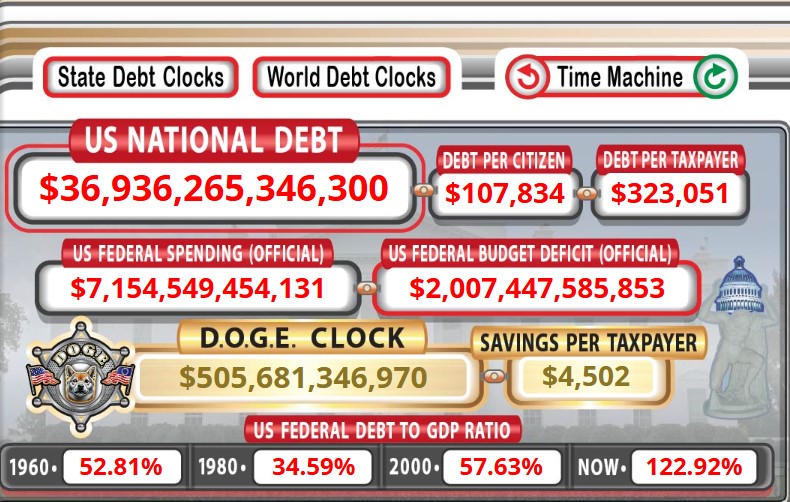
Is rocket science easier than downsizing the federal government?
Joining President Donald Trump in the Oval Office to mark the end of his tenure with the Department of Government Efficiency, Elon Musk said, “It’s a tough call, but I think colonizing Mars and making life multiplanetary is harder” than making the federal government more efficient.
It should worry taxpayers that after spending time in government, Musk says that landing humans on Mars is in the same difficulty range as getting D.C.’s elected class to end its chronic spending addiction and avoid the nation’s looming financial trainwreck.
While DOGE stumbled out of the gate, its core aim — reducing unsustainable federal spending, modernizing antiquated technology, and eliminating counterproductive regulation — is essential in preventing the United States from slipping into financial ruin.
DOGE’s rollout was messy. Tens of thousands of abrupt firings of federal workers lacked transparency and explanations, sparked a backlash, and led to reversals by DOGE itself and the courts. DOGE also terminated over 10,000 federal contracts and 15,000 grants in a similarly chaotic process. These actions were applied with chainsaws rather than scalpels, resulting in too many real and perceived blunders. Some Republicans who initially supported the DOGE concept have branded its execution as reckless and overly aggressive. By contrast, many libertarians and budget hawks are underwhelmed by the lack of meaningful structural reforms, ever-diminishing estimates of DOGE’s savings and its focus on gloss over substance.
However, DOGE is needed because federal spending has exceeded federal revenue every year since 1970, except for three years between 1998 and 2001. The national debt has more than tripled since 2008 and now equates to over $100,000 in debt for every American. The federal government borrows money yearly just to keep the lights on, and the annual cost of paying the interest owed on the $36 trillion national debt is now roughly equivalent to annual Medicare spending. The biggest federal program and largest part of the budget, Social Security, is projected to go insolvent within a decade as more Baby Boomers retire.
Households and companies spending this way would go bankrupt. There’s an urgent need to act. Yet Congress is trying to pass Trump’s ‘big, beautiful bill,” which will add an estimated $2 trillion to $5 trillion to the debt.
While getting humans to Mars is a solvable math problem that boils down to developing advanced propulsion and life support systems, the politics of government budgets and spending have become a rabbit’s nest of bureaucratic inertia, partisan machinations and special interests in which the fundamental math problem, chronic deficit spending that’s yielded today’s debt, is ignored and unsolved.
More than 80,000 pages of federal regulations are on the books today, more than any government can competently manage. Agencies like the Department of Veterans Affairs and the nation’s air traffic control system rely on technology from the 1980s and even the 1960s. The number of federal employees has continued to grow because agencies haven’t embraced technology, automation and artificial intelligence the way the private sector has to improve customer service and outcomes and reduce labor costs.
Efficiency is critical amid the government’s financial disorder. If Musk failed, it was because Congress must be an equal partner in methodically rightsizing the workforce and legislatively pruning unnecessary spending and regulations. That was the lesson learned from the most successful government downsizing operation in decades, the cost-cutting closure of over 120 military bases nationwide since the 1980s via the Base Realignment and Closure Commission. What had been a politically fraught process was improved by expert commissions that developed objective criteria and targeted cuts, codified by Congress in legislation and enacted on pure up-or-down votes designed to minimize the political heat for any individual politician.
Government reform works best when the executive and legislative branches collaboratively design the necessary solutions and agree to jump off the cliff and implement them together.
Musk’s departure from DOGE doesn’t change the desperate need for improved efficiency, modernization and federal spending cuts. Without massive reform, we’ll keep spending far more than we bring in, debt will keep spiraling, entitlement programs will soon crash, and we will decline into a debtor nation that can’t pay for its promises to citizens, retirees or creditors.
It would be sad if our human achievements in engineering allow us to set foot on Mars before Congress and the White House figure out how to engineer a sustainable financial path.
Gilroy is vice president of government reform at the Los Angeles-based Reason Foundation. He lives in the Phoenix area.



